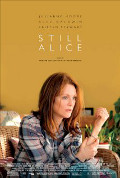
Directed by
Richard Glatzer / Wash Westmoreland
99 minutes
Rated M
Reviewed by
Sharon Hurst

Still Alice
Synopsis: Alice Howland (Julianne Moore) is a successful, dedicated 50-year-old linguistics professor, happily married to John (Alec Baldwin). In the middle of a lecture she is at a loss to find the right word, and subsequently more disturbing events occur, leading Alice to consult a neurologist. When the bombshell is dropped, that she has early onset genetically-inherited Alzheimer’s disease, Alice gathers her family of grown children to tell them the shocking news. Lydia (Kristen Stewart), Anna (Kate Bosworth) and Tom (Hunter Parish), as well as their father, must come to grips with what this diagnosis means, but most of all Alice must struggle to stay connected to who she once was.
With all of us living longer, this heartbreaking yet inspiring film is of great relevance today. Alzheimer’s is, probably more than any other, the disease of our times. In Alice we meet a person who knows what is happening to her, is smart enough to devise strategies to help herself and to conceal her condition, but ultimately must experience the nightmare of losing herself.
The film is based upon a well-respected novel by neuroscientist Lisa Genova. Stories like this can run the risk of being manipulative, but this one stays firmly grounded in reality and anchored by a rivetting and deservedly Oscar nominated performance from Moore as a pragmatic woman determined to grapple with her condition head on.
The film deftly handles the many negative ramifications for an Alzheimer’s sufferer’s life – not just the personal issues, but those of work and family relationships. The competence and likeability of Alice are established early on, along with her happy family and work relationships, so we feel all the more for her plight. There are however, no attempts to sensationalise or sentimentalise unfolding events but rather the focus is firmly on the philosophical and psychological issues of who we actually are deep down.
The supporting cast are wonderful. The ever-lovable Baldwin plays an admirably supportive husband, while Kristen Stewart (best known as Bella in the vampire Twilight series) shows she really can act, bringing a sensitivity and truthfulness to Lydia, a sometimes sulky young woman hoping to find herself as an actress, but deeply connected to her mother. She and Moore have a final scene in the film guaranteed to leave no dry eye in the house.
Although the look of the film is clear-eyed, French cinematographer Denis Lenoir also uses blurriness to wonderful effect when required. Thus when early on in the story Alice gets lost while out on a familiar run, the camera whirls and swirls around her and we feel her disorientation. Co-director Glatzer was suffering the horrendous ALS (also known as Lou Gehrig’s disease) while making the film and that no doubt accounts for the truthfulness of what we see on screen.
Films of this nature, I believe, are extremely important, not only because they speak to contemporary issues but also for giving us a compassionate approach to what is possibly the worst thing a human can undergo – losing themselves while still living.

Want more about this film?


Want something different?




